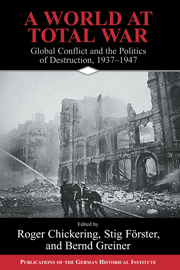Book contents
- Frontmatter
- Are We There Yet? World War II and the Theory of Total War
- Part A The Dimensions of War
- Part B Combat
- Part C Mobilizing Economies
- Part D Mobilizing Societies
- Part E The War against Noncombatants
- 14 Partisan War in Belorussia, 1941-1944
- 15 Allied Bombing and the Destruction of German Cities
- 16 “Accidental Judgments, Casual Slaughters”: Hiroshima, Nagasaki, and Total War
- Part F Criminal war
- Index
16 - “Accidental Judgments, Casual Slaughters”: Hiroshima, Nagasaki, and Total War
Published online by Cambridge University Press: 05 January 2013
- Frontmatter
- Are We There Yet? World War II and the Theory of Total War
- Part A The Dimensions of War
- Part B Combat
- Part C Mobilizing Economies
- Part D Mobilizing Societies
- Part E The War against Noncombatants
- 14 Partisan War in Belorussia, 1941-1944
- 15 Allied Bombing and the Destruction of German Cities
- 16 “Accidental Judgments, Casual Slaughters”: Hiroshima, Nagasaki, and Total War
- Part F Criminal war
- Index
Summary
My purpose here is to discuss the advent of the atomic bomb as part of a process that, if not a master narrative leading inevitably to total war, has taken us to the brink and allowed us to see into the abyss of the unthinkable, our self-destruction by means of our own invention. That invention is not only nuclear weapons. It is also the concept of total war.
As has been observed elsewhere in this collection of essays, total war as an abstract theoretical concept may never have happened in history. But in my opinion World War II comes close enough to that fearful reality. It was in many respects history's most total war. That first truly global conflict mobilized economies and populations of the world on a scale and to a degree that, if not total, was unprecedented in history. The Allied war aims were the unconditional surrender and total subjugation of the Axis powers. Hitler's goals were imperial, ideological, and genocidal. In theory, Japan's slogan “Asia for Asians” and the promise of a Greater East Asian Co-Prosperity Sphere might have appealed to anticolonial nationalists. In practice, Japan's brutal conquest of native Asian populations - including the enslavement of Koreans, the use of chemical and biological warfare in China, the slaughter of Chinese civilians, the torture and starvation of prisoners - characterized a total war mentality restricted only by available means. In the end, that extremist mentality revealed itself in Japan's irrational inability to accept defeat in the face of horrific losses as total war was brought home to its people in the form of naval blockade, massive conventional bombing, and finally, nuclear weapons.
- Type
- Chapter
- Information
- A World at Total WarGlobal Conflict and the Politics of Destruction, 1937–1945, pp. 297 - 314Publisher: Cambridge University PressPrint publication year: 2004



